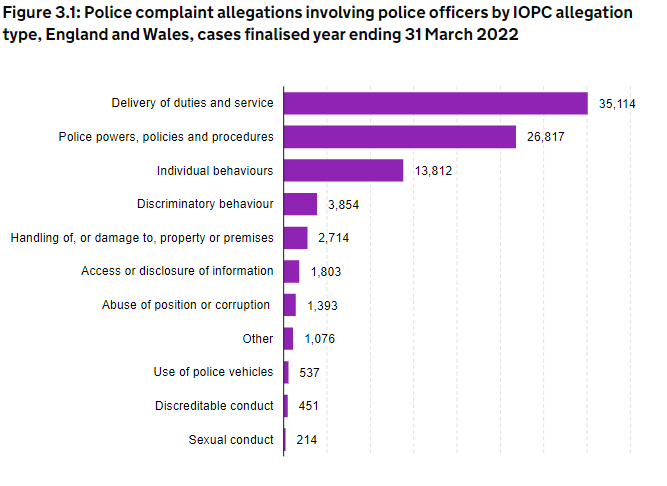No action taken on 90% of complaints against police officers, figures show
Year sees thousands of allegations of excessive use of force, corruption and racism

No action has been taken on almost 90 per cent of complaints against police in England and Wales, figures show.
Of over 86,000 allegations handled under an official process in 2021-22, a tiny 0.2 per cent resulted in disciplinary proceedings.
The complaints included almost 4,000 claims of discriminatory behaviour by police officers, including racism and misogyny, 10,000 over the use of force, 1,400 accusations of corruption and abuse of position and more than 200 of alleged sexual misconduct.
It comes after the murder of Sarah Everard by a serving police officer and a series of scandals over corruption and discrimination, which sparked a public inquiry into police vetting and culture.
A Home Office report published on Thursday showed that 89 per cent of complaints against police officers were categorised as “no action required” and 11 per cent were assigned a “learning outcome”, which includes a process police bodies call “reflective practice”.
Only 0.2 per cent – 158 complaints – resulted in formal disciplinary proceedings and just a small fraction of those saw officers sacked.
The figures were published after Metropolitan Police commissioner Sir Mark Rowley said he had been forced to reinstate officers who were dismissed after being deemed unfit to serve.
He told BBC Radio 4’s Today programme the situation was “crazy”, adding: “We have some very worrying cases with officers who’ve committed criminality whilst police officers and yet I’m not allowed to sack them.”
Sir Mark said that some officers who had been sacked were reinstated by other legal bodies, warning: “I’ve got officers who we determined shouldn’t be police officers and yet I have to keep them. It sounds bizarre.”
The single largest number of complaints across England and Wales were about the action police took in response to calls, followed by the general level of service, use of force, the decisions made on cases, the use of arrest powers and “an unprofessional attitude and disrespect”.
Other common allegations were sparked by the search and seizure of property, use of police custody, impoliteness, “overbearing or harassing behaviours”, racism and a lack of impartiality.

In 70 per cent of complaints against police officers, investigations found that the “service provided was acceptable”, while it was only deemed unacceptable in 10 per cent of cases.
Only 46 complaints against police officers resulted in a misconduct hearing in a year, and the most common outcome was a written warning – with officers sacked in just nine cases. In a further seven, officers would have been dismissed if they had not resigned before proceedings started.
The figures showed that a much higher number of officers are sacked for “recordable conduct matters”, which are separate from complaints and cover actions resulting in death and serious injury and criminal convictions.
In 2021-22, 93 of those cases saw officers dismissed and a further 133 would have been sacked if they were still serving.
The national police lead for complaints, Chief Constable Craig Guildford, said leaders were “committed to rooting out those who betray our professional standards”.
“No officer or member of staff who engages in abusive or inappropriate behaviour should think that they can hide within policing,” he added.
“Changes to misconduct regulations have helped policing to determine the facts of a case more quickly, remove or sanction those guilty of misconduct, and exonerate the innocent.”
Mr Guildford warned that enhanced efforts to remove unfit officers and embolden colleagues to report them would mean that “more misconduct will be uncovered” in future.
He added: “While every example is uncomfortable and difficult, each action we take to detect misconduct is a demonstration of our values, our intolerance of those who don’t uphold them, and our unrelenting determination to uphold the highest standards of professional behaviour.”
The Home Office said home secretary Suella Braverman had made it clear to police that there was “no place for officers who fall seriously short of the acceptable standards of behaviour and are not fit to wear the uniform”.
“Police forces must root out these officers to restore the public’s trust, which has been shattered by recent high-profile events,” a spokesperson added.
“The Home Office is playing an active role in pushing for improvement and has recently announced a review into police dismissals to ensure that the system is effective at removing officers. The Angiolini Inquiry is also looking at issues around police culture and the safety of women.”






Join our commenting forum
Join thought-provoking conversations, follow other Independent readers and see their replies
Comments